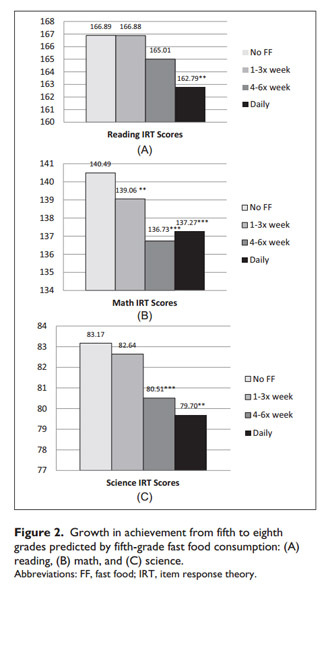Fast food, slow kids: Eating junk leads to poorer academic results, study shows

Children who eat the most fast-food tend to get significantly poorer scores in math, science and reading tests, a new nationwide study that examined the habits of over 8,500 young Americans reveals.
Parents now have a new matter of concern regarding their kids’ fast-food consumption, as it correlates with future academic achievements, not to mention obesity and skin problems.
Visits to popular restaurants such as McDonald’s, Burger King, Pizza Hut and KFC, at the age of 10, could have ill-effects three years later, in eighth grade, says the report, published in Clinical Pediatrics journal this month.
“Research has been focused on how children’s food consumption contributes to the child obesity epidemic. Our findings provide evidence that eating fast food is linked to another problem: poorer academic outcomes,” leading author Kelly Purtell at Ohio State University told the Telegraph.
READ MORE: US fast-food chains ‘disproportionately’ targeting black youth – study

The longitudinal study boasts models controlling numerous potentially-confusing variables, including socioeconomic indicators, such as family income and place of living, as well as physical activity and TV watching, that could influence the results.
It suggested two theories, explaining the impact of fast-food on learning processes. According to one theory, it is the lack of a specific nutrient, iron, usually associated with fast-food that slows down certain processes in the brain. Another theory links degradation in academic achievements and decreased attention to high amount of fat and added sugar.
READ MORE: Not lovin' it: McDonald's sales in US plummet
The scientists analyzed the rates of fast-food consumption among children to learn that 10 percent had eaten it every day, another 10 percent had eaten it four to six times in the previous week. Over half of the representative sample - more than 8,500 people - or 52 percent had eaten fast food between one and three times during the same period.
Most impressive, the test results in science among the daily fast-food eaters saw an average of 79 percent, while those who never ate fast food (29 percent) scored 83. The “clear and consistent associations” are also observational in scores for reading and math.
READ MORE: Obesity price tag: $2trn annually and ‘rapidly getting worse’
The researchers regard pricing and taxes as “potential mechanisms for reducing fast-food consumption.”












